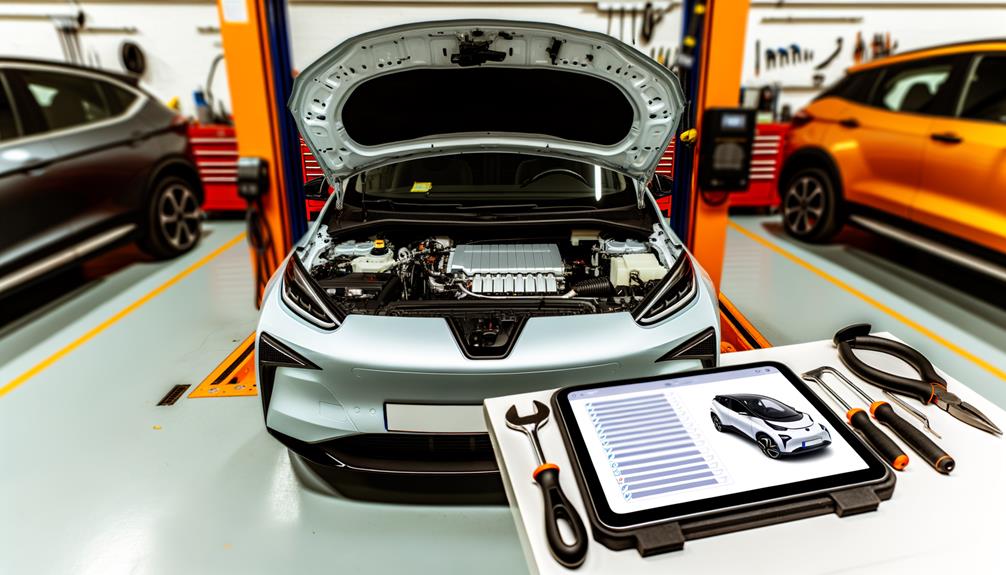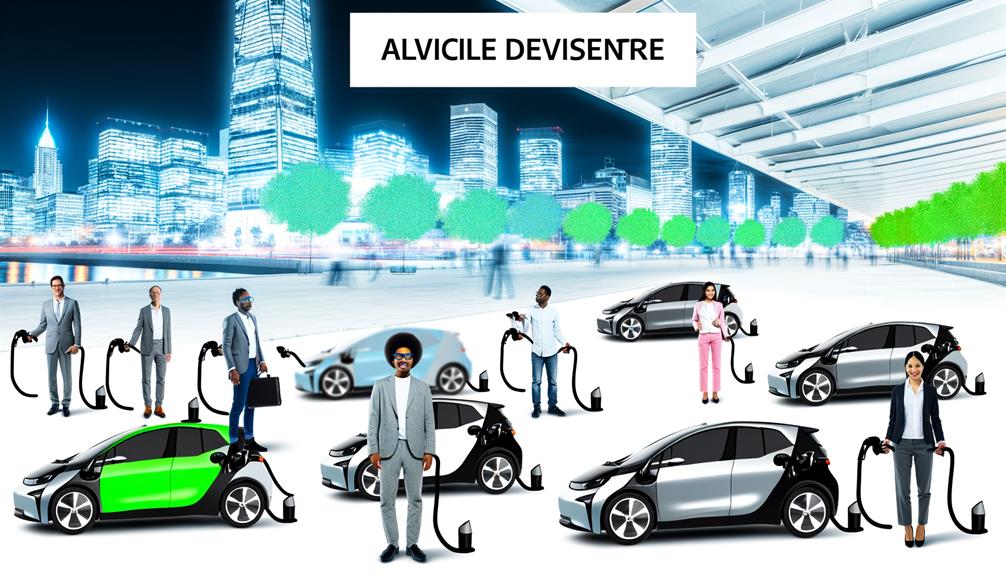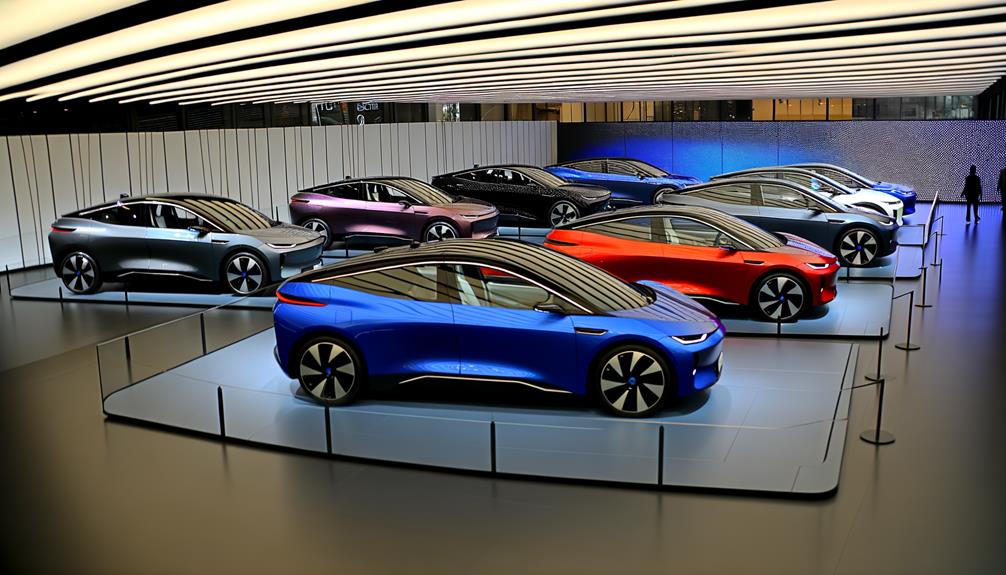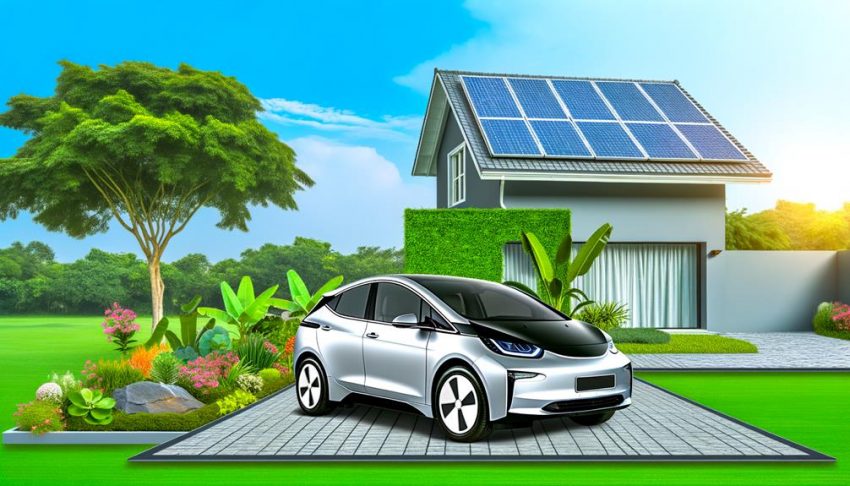When considering whether an electric car is worth the investment, it's essential to weigh several factors. You'll find that driving performance and range have seen significant improvements, making EVs more practical for everyday use. While the upfront cost might seem steep, the long-term savings on fuel and maintenance can't be ignored. Plus, there's the added benefit of zero tailpipe emissions, which is a win for the environment. However, questions about charging infrastructure and accessibility still linger. So, is an electric car the right choice for you? Let's explore further to see if it meets your specific needs and expectations.
Contents
Driving Performance and Range
Why should you consider an electric vehicle (EV) for driving performance and range? Well, let's start with the fact that electric cars offer unparalleled driving performance. Thanks to instant torque delivery, EVs like the Tesla Model 3 can achieve 0-60 mph in just 3.1 seconds. This kind of acceleration isn't just impressive on paper; it translates to a thrilling and responsive driving experience that traditional internal combustion engine vehicles struggle to match.
When it comes to range, the landscape has dramatically improved, reducing the once-common range anxiety among potential EV buyers. For instance, the Lucid Air boasts an impressive range of up to 516 miles on a single charge, putting it on par with many gasoline cars. Even the average range for most EVs sits at around 211 miles, which is more than sufficient given that the average American commute is roughly 41 miles per day. This renders the fear of running out of charge during daily use largely irrelevant for most drivers.
However, it's crucial to note that not all EVs are created equal. The Nissan Leaf, for example, offers a range of 149 miles, which might be limiting for some users. As battery technology continues to advance, we're seeing more models that comfortably meet or exceed daily driving needs, further mitigating range anxiety.
Cost Efficiency and Considerations
When considering the cost efficiency of electric vehicles (EVs), you'll find compelling financial advantages that make them an attractive option. Let's break down the key factors that contribute to the overall cost efficiency of EVs:
- Fuel Costs: Electric cars generally have lower fuel costs. For example, the Kia Niro EV has an estimated annual fuel cost of $650 compared to $1,000-$1,050 for its gas-powered counterparts. This translates to potential savings of up to $709 per year.
- Initial Purchase Price: While the initial EV purchase price is higher—around $12,660 more in the case of the Kia Niro EV versus the gas model—this gap can be mitigated by federal tax credits. These credits can provide up to $7,500 in savings, although eligibility varies by model.
- Maintenance Costs: EVs generally cost $949 less annually to maintain than gas vehicles. Over five years, this could mean a savings of approximately $4,745, thanks to fewer moving parts and the absence of oil changes.
- Ownership Costs: Despite the higher upfront investment, the combination of reduced fuel and maintenance costs often results in overall cost efficiency. Over time, these savings can make electric cars worth considering for their long-term economic benefits.
Maintenance Advantages

Although electric vehicles (EVs) may initially seem more expensive, their maintenance advantages quickly become apparent. One of the most compelling benefits is the lower maintenance complexity. EVs have far fewer moving parts compared to gas vehicles, leading to simpler designs and considerably reduced maintenance needs. This simplicity translates into real-world savings for EV owners.
According to data from AAA, EVs cost an average of $949 less to maintain annually than their gasoline counterparts. This substantial reduction in maintenance costs is largely due to the elimination of routine maintenance tasks required by internal combustion engines. For instance, EV owners don't have to worry about oil changes or engine air filter replacements, both of which are standard for traditional vehicles. Over a five-year period, these savings can accumulate to an impressive $4,745, making EVs a smart choice for those looking to maximize overall cost efficiency.
The electric motors in EVs are inherently less demanding than internal combustion engines. They don't require the same level of servicing, which further contributes to lower maintenance costs. This not only reduces the financial burden on EV owners but also minimizes the time and hassle associated with frequent trips to the mechanic.
Market trends indicate that as more people become aware of these maintenance advantages, the adoption rate of electric vehicles is likely to rise. Lower maintenance costs, combined with other benefits, make EVs an increasingly attractive option. To sum up, while the upfront cost of electric vehicles may be higher, their long-term maintenance savings undeniably enhance their overall cost efficiency.
Environmental Impact
Electric vehicles (EVs) offer a compelling advantage when it comes to environmental impact, primarily through their zero tailpipe emissions. This key feature considerably reduces local air pollutants, contributing to improved public health in urban areas. Furthermore, the overall greenhouse gas impact of EVs is markedly lower than that of gasoline vehicles when you consider a full lifecycle analysis.
Here's a closer look at why EVs are more environmentally friendly:
- Zero Tailpipe Emissions: Unlike conventional vehicles, EVs produce zero tailpipe emissions, reducing harmful pollutants like nitrogen oxides and particulates that degrade air quality and harm public health.
- Lower Carbon Footprint: Studies show that the average EV emits about 200 grams of CO2 per mile over its lifetime, compared to over 350 grams for gasoline vehicles. This substantial difference underscores the reduced carbon footprint of EVs.
- Lifecycle Analysis: While battery production for EVs does generate initial emissions, these are offset by the lower emissions during the vehicle's operational life. Over time, EVs prove to be more environmentally friendly.
- Renewable Energy Integration: When EVs are powered by renewable energy sources, their carbon footprint is minimized even further. This synergy supports broader climate change initiatives and accelerates the shift to a sustainable future.
Additionally, ongoing advancements in battery recycling and sustainable production methods are enhancing the overall environmental impact of electric vehicles. These improvements address concerns related to lithium mining and battery disposal, making the entire lifecycle of EVs more sustainable.
Charging Infrastructure and Accessibility

Charging infrastructure and accessibility are crucial factors in the broader adoption of electric vehicles (EVs). As of now, there are approximately 49,000 public charging stations available nationwide, and their number continues to grow. This expansion of charging stations is essential for facilitating greater access for EV owners and driving the shift towards electric mobility.
Most EVs can be conveniently charged at home using standard 120 Volt outlets. However, if you're looking for faster charging times, a 240 Volt outlet is highly recommended. Home charging remains a cornerstone for everyday driving needs, providing a reliable and efficient solution, especially when facing limited charging infrastructure in certain regions.
Fast-charging stations are becoming increasingly prevalent, particularly in urban areas. These stations considerably reduce charging times, making EVs more practical for city dwellers. The presence of fast-charging stations in urban centers supports the growing trend of EV adoption, addressing the demands of densely populated areas where access to home charging might be limited.
For long-distance travel, the availability of charging stations can pose a challenge. Limited charging infrastructure in certain regions emphasizes the importance of planning your routes and relying on home charging when possible. Still, both government and private sectors are heavily investing in the development of more charging stations, which bodes well for the future of long-distance EV travel.
Ultimately, the evolution of charging infrastructure and its accessibility directly influence the feasibility and attractiveness of owning an electric car. As charging networks continue to expand and improve, the convenience and practicality of EVs will likely see a notable boost, contributing to their widespread adoption.
Safety and Insurance
When evaluating the safety and insurance aspects of electric vehicles (EVs), it's crucial to recognize that these cars undergo rigorous safety testing comparable to their gasoline counterparts, guaranteeing they meet stringent industry standards. Modern EVs are designed with multiple safety features to mitigate risks associated with battery performance, dispelling concerns about battery explosions. This makes EVs a secure option for daily driving.
When considering insurance for EVs, several factors come into play:
- Insurance Premiums: The cost of insuring an EV can vary widely. Luxury EVs tend to have higher insurance premiums due to increased repair expenses, while more economical models may be less costly to insure.
- Advanced Safety Features: Many EVs come with state-of-the-art safety technology such as automatic emergency braking, lane-keeping assist, and adaptive cruise control. These features often qualify for insurance discounts, potentially offsetting higher premiums.
- Repair Expenses: Repairing an EV can be more expensive than a traditional vehicle, primarily due to the specialized components and technology involved. This factor contributes to the overall insurance cost.
- Warranties and Battery Performance: EVs often come with extensive warranties that cover battery performance, providing additional peace of mind. These warranties guarantee that if something goes wrong with the battery, you're covered for a significant period.
Insurance companies are increasingly recognizing the advanced safety features in EVs and offering incentives. While luxury EVs may carry higher premiums, the peace of mind provided by thorough warranties and advanced safety features makes them a compelling choice. By understanding these factors, you can make an informed decision about whether an electric car is worth the investment for you.
Model Choices and Variety

While safety and insurance are key considerations, the variety and model choices in the electric vehicle market offer compelling reasons for buyers to explore EVs. The electric vehicle landscape is more diverse than ever, with sedans, SUVs, trucks, and luxury vehicles all making their mark. Major manufacturers like Volvo and Hyundai are expanding their EV lineups, introducing models such as the Volvo ES90 battery-electric sedan and the 2025 Hyundai Ioniq 5 XRT. These new electric options cater to a wide range of consumer preferences, from luxury seekers to eco-conscious families.
However, it's crucial to recognize that there are currently no new EV models priced under $20,000. Most start in the mid- to high-$20,000s, which means there's a noticeable gap in affordable options for those looking to make a budget-friendly switch from a gas-powered vehicle. Despite this, the growing market for used EVs is bridging the gap, offering more budget-friendly alternatives without compromising on quality or features.
Consumer preferences are clearly influencing future EV designs, with manufacturers tailoring their offerings to meet diverse needs. This trend is evident in the increasing variety of models available, reflecting a market that's responsive to what buyers want. Whether you're looking for a compact city car, a family-friendly SUV, or a high-performance luxury vehicle, the expanding model choices guarantee there's an electric vehicle that fits your lifestyle.
Frequently Asked Questions
Is Buying an Electric Car a Good Idea?
Buying an electric car's a good idea considering environmental impact, lower maintenance costs, and government incentives. With advancing technology, improved driving range, expanding charging infrastructure, and favorable market trends, EVs align well with evolving consumer preferences and energy sources.
Are You Really Saving Money With an Electric Car?
You're likely saving money with an electric car due to lower charging costs, significant maintenance savings, and government incentives. Consider factors like battery lifespan, environmental impact, resale value, insurance rates, fuel comparison, energy sources, and driving experience.
How Many Years Does an Electric Car Last?
An electric car can last 8-15 years, with battery lifespan heavily influenced by maintenance costs, charging habits, and climate. Warranty coverage, resale value, driving range, and technological advancements enhance the ownership experience, energy efficiency, and environmental impact.
What Is the Disadvantage of Driving an Electric Car?
Driving an electric car has disadvantages like limited charging infrastructure, range anxiety, and high initial investment. Battery lifespan concerns, technology reliability, and lower resale value also weigh in, despite lower maintenance costs, environmental impact benefits, and government incentives.
Conclusion
To sum up, if you're considering an electric car, you're looking at a smart investment. The driving performance is stellar, and long-term cost efficiency is backed by lower fuel and maintenance costs. Environmentally, EVs are a clear winner with zero tailpipe emissions. As charging infrastructure grows and more models hit the market, electric vehicles are becoming increasingly accessible. They're a forward-thinking choice, aligning with current market trends and environmental goals.
